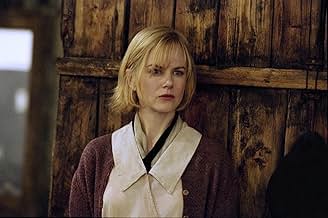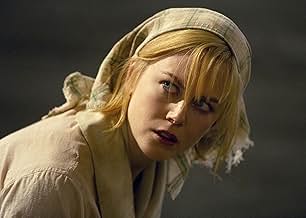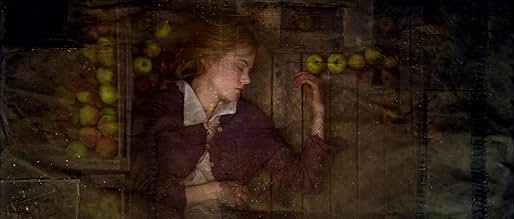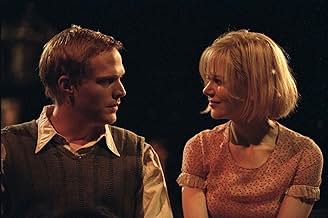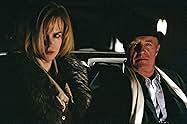Una donna in fuga da criminali viene accettata e nascosta dagli abitanti di una piccola città del Colorado; ma quando qualcuno viene a cercarla, scopre che il loro aiuto ha un prezzo.Una donna in fuga da criminali viene accettata e nascosta dagli abitanti di una piccola città del Colorado; ma quando qualcuno viene a cercarla, scopre che il loro aiuto ha un prezzo.Una donna in fuga da criminali viene accettata e nascosta dagli abitanti di una piccola città del Colorado; ma quando qualcuno viene a cercarla, scopre che il loro aiuto ha un prezzo.
- Regia
- Sceneggiatura
- Star
- Premi
- 21 vittorie e 33 candidature
Trama
Lo sapevi?
- QuizPaul Bettany, who only took the part of Tom Edison after being convinced by friend Stellan Skarsgård, later called the making of this movie "hideous" and "a peculiarly unsatisfying experience, because Lars von Trier has no interest in you being any part of the cerebral process with him. You're absolutely his puppet." Despite still being a fan of von Trier's movies in general, Bettany has never watched this movie, and has no intention of ever doing so.
- BlooperJack refers to the steeple casting a shadow which touches the O of the store's open sign at exactly 5 PM each day. This would actually only occur on a few days each year, as the lengths and positions of shadows are constantly changing through the seasons.
- Curiosità sui creditiClosing credits play over photographs depicting crime and poverty in the United States.
- Versioni alternativeTo fit the needs of some local distributors, in Italy among others, assistant director Anders Refn cut a version of Dogville which is about 45 minutes shorter than the original. The version was accepted and approved by director Lars von Trier.
- ConnessioniFeatured in Trier, Kidman og Cannes (2003)
- Colonne sonoreYoung Americans
Written and Performed by David Bowie
Courtesy of RZO Music, Inc.
Published by Chrysalis Music Limited / EMI Music Publishing Limited / RZO Music Limited
[Played over end credits]
Recensione in evidenza
Is this a tale about the loss of humanity as an individual suffers from the power of group behavior? Is it a about an idealist / philosopher unable to handle events and see the tragedy around him? Is this a scathing attack on the social conditions in the US? Or is it about the New World reversing power roles with the Old World? Is it a biblical allegory? Or an autobiographical description of Von Trier's life?
Dogville, made as a staged play and inspired by the song Pirate Jenny by Bertolt Brecht, is all, making not the structure of the tale set in a Colorado mining town complex, but its interpretation. Like in Breaking the Waves, Von Trier uses the literature reference, dividing the movie in chapters to tell his tale of an individual becoming victim of group behavior, this time combined with the idealist / intellectual standing by and having no solutions on offer. It all watches like a Greek tragedy, the Greek names of the children of Vera and Chuck only confirming this.
The biblical parts are thrown in with the dog Moses, as guardian of the Ten Commandments which are severely transgressed by the citizens of Dogville. The dog can only be seen at the end and is spared. We have the name of the main character Grace and her treatment comparable to that of Jesus; the blindness and the window; the seven figurines broken by Vera stand both for her seven children and the seven sins. Also the Old and New Testament (father and daughter in the car having different interpretations of morality) are touched upon, and Tom representing the betrayal of Judas.
The concept of power plays an important part throughout the movie. The line of power starts with Tom, convincing the citizens of Dogville to give Grace a place to hide. As the philosopher, writer and spiritual leader of Dogville he is unable to cope with the basic problem of keeping mankind under control, he is shown as a theoretic, not someone who has practical solutions and fails as an authority (the practical engineer only adds to the misery here as he only makes instruments of oppression). Later the power is taken on by the group to commit the atrocities shown. Dogville is therefore also a warning about letting ignorant and simple minded people take on authority and decisions as there can be horrific consequences. At the end Grace's father comes in and Grace assumes the power from him. All misuse and are unable to handle the concept of power to proper use, the power of Grace and her father is mafia power after all (there is a hint the movie uses that the power of the US has grown out of criminal power, a common historical misunderstanding). The US State is unable to prevent anything of it happening here, it can only be heard in the distance or seen shortly when the police arrives (a prison and police force is the only thing the state offers in the movie). Dogville starts with a speech to be heard on the radio made by the President of the US; the radio is turned off before he starts talking. The end credits with the pictures give way to interpretations of the lack of a proper welfare state in the US, at least at the time of the Depression.
Another moral issue arises in the most important dialog in the movie between Grace and her father. At first Grace is incapable to condemn the villagers. Her father calls that arrogance, because she should judge others by the same moral standards as she judges herself. She changes mind after thinking about this concept of morality, judgment and punishment. The whole view on mankind in Dogville is extremely dark: As you make yourself dependent of other people, they will always misuse that opportunity and take advantage of your weaknesses. Later Grace forgets all notions of forgiveness.
Another interesting addition and layer comes when Tom suddenly takes on the role of Von Trier himself (the point where he talks about the trilogy). So in reality Von Trier sees himself in the role of Tom. And he makes a deliberate parody of himself, because the harsh and demanding way he treats actresses is in a way comparable to the treatment of Grace.
Technically the movie is well shot with the camera-work of Anthony Dod Mantle. When Grace is raped for the first time, the camera retracts and it diminishes on purpose the impact of that scene. By showing inhuman acts without barriers like walls and doors they show how ignorant people usually are about them. But the best shot technically is from Grace under a blanket in the truck, it has surreal qualities.
Two side notes: The beautiful music is by Vivaldi ('Cum dederit dilectus suis somnum' (IV) from 'Nisi dominus' RV 608). On the mine shaft we can read Dictum ad Factum, meaning Said and Done.
Dogville, made as a staged play and inspired by the song Pirate Jenny by Bertolt Brecht, is all, making not the structure of the tale set in a Colorado mining town complex, but its interpretation. Like in Breaking the Waves, Von Trier uses the literature reference, dividing the movie in chapters to tell his tale of an individual becoming victim of group behavior, this time combined with the idealist / intellectual standing by and having no solutions on offer. It all watches like a Greek tragedy, the Greek names of the children of Vera and Chuck only confirming this.
The biblical parts are thrown in with the dog Moses, as guardian of the Ten Commandments which are severely transgressed by the citizens of Dogville. The dog can only be seen at the end and is spared. We have the name of the main character Grace and her treatment comparable to that of Jesus; the blindness and the window; the seven figurines broken by Vera stand both for her seven children and the seven sins. Also the Old and New Testament (father and daughter in the car having different interpretations of morality) are touched upon, and Tom representing the betrayal of Judas.
The concept of power plays an important part throughout the movie. The line of power starts with Tom, convincing the citizens of Dogville to give Grace a place to hide. As the philosopher, writer and spiritual leader of Dogville he is unable to cope with the basic problem of keeping mankind under control, he is shown as a theoretic, not someone who has practical solutions and fails as an authority (the practical engineer only adds to the misery here as he only makes instruments of oppression). Later the power is taken on by the group to commit the atrocities shown. Dogville is therefore also a warning about letting ignorant and simple minded people take on authority and decisions as there can be horrific consequences. At the end Grace's father comes in and Grace assumes the power from him. All misuse and are unable to handle the concept of power to proper use, the power of Grace and her father is mafia power after all (there is a hint the movie uses that the power of the US has grown out of criminal power, a common historical misunderstanding). The US State is unable to prevent anything of it happening here, it can only be heard in the distance or seen shortly when the police arrives (a prison and police force is the only thing the state offers in the movie). Dogville starts with a speech to be heard on the radio made by the President of the US; the radio is turned off before he starts talking. The end credits with the pictures give way to interpretations of the lack of a proper welfare state in the US, at least at the time of the Depression.
Another moral issue arises in the most important dialog in the movie between Grace and her father. At first Grace is incapable to condemn the villagers. Her father calls that arrogance, because she should judge others by the same moral standards as she judges herself. She changes mind after thinking about this concept of morality, judgment and punishment. The whole view on mankind in Dogville is extremely dark: As you make yourself dependent of other people, they will always misuse that opportunity and take advantage of your weaknesses. Later Grace forgets all notions of forgiveness.
Another interesting addition and layer comes when Tom suddenly takes on the role of Von Trier himself (the point where he talks about the trilogy). So in reality Von Trier sees himself in the role of Tom. And he makes a deliberate parody of himself, because the harsh and demanding way he treats actresses is in a way comparable to the treatment of Grace.
Technically the movie is well shot with the camera-work of Anthony Dod Mantle. When Grace is raped for the first time, the camera retracts and it diminishes on purpose the impact of that scene. By showing inhuman acts without barriers like walls and doors they show how ignorant people usually are about them. But the best shot technically is from Grace under a blanket in the truck, it has surreal qualities.
Two side notes: The beautiful music is by Vivaldi ('Cum dederit dilectus suis somnum' (IV) from 'Nisi dominus' RV 608). On the mine shaft we can read Dictum ad Factum, meaning Said and Done.
I più visti
Accedi per valutare e creare un elenco di titoli salvati per ottenere consigli personalizzati
Dettagli
- Data di uscita
- Paesi di origine
- Siti ufficiali
- Lingue
- Celebre anche come
- The Film 'Dogville' as Told in Nine Chapters and a Prologue
- Luoghi delle riprese
- Aziende produttrici
- Vedi altri crediti dell’azienda su IMDbPro
Botteghino
- Budget
- 10.000.000 USD (previsto)
- Lordo Stati Uniti e Canada
- 1.535.286 USD
- Fine settimana di apertura Stati Uniti e Canada
- 88.855 USD
- 28 mar 2004
- Lordo in tutto il mondo
- 16.690.617 USD
- Tempo di esecuzione2 ore 15 minuti
- Colore
- Mix di suoni
- Proporzioni
- 2.35 : 1
Contribuisci a questa pagina
Suggerisci una modifica o aggiungi i contenuti mancanti





